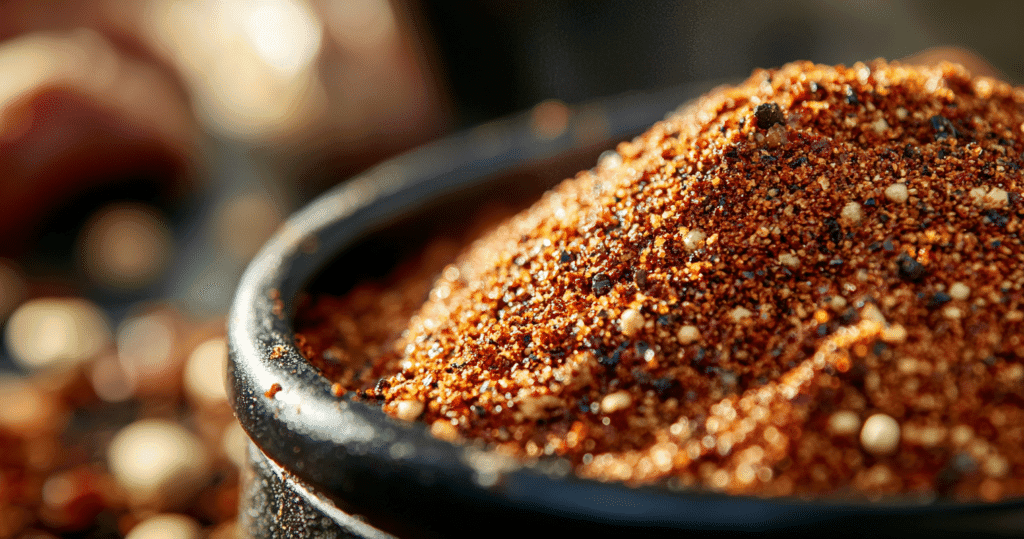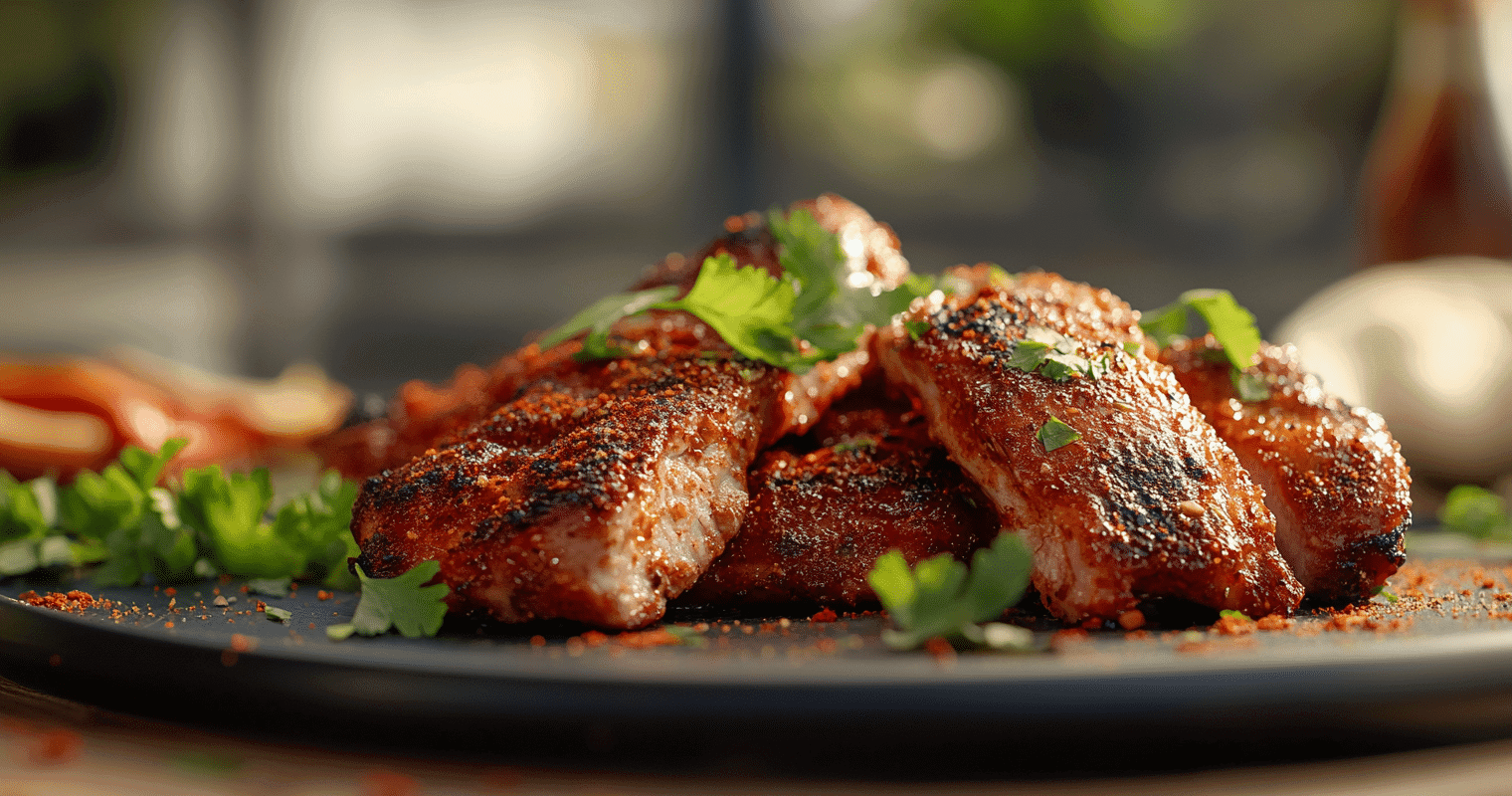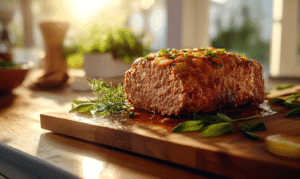Jump to:
Estimated reading time: 14 minutes
Table of contents
Introduction
Barbecue seasoning is the heart and soul of any great BBQ dish. Whether you’re grilling up a batch of ribs, chicken, or vegetables, the right seasoning can indeed make all the difference in flavor. However, with so many options available, you might wonder, what is the best barbecue seasoning blend? Indeed, finding the ideal mix of spices and herbs that enhances your grilling and suits your taste is key to mastering the art of barbecue.
In this article, we will delve into the characteristics of the best barbecue seasoning blend and what makes it stand out. Additionally, we’ll explore the essential ingredients that should be in every top-notch barbecue seasoning, how to customize your blend, and what to look for when choosing a ready-made option. Whether you’re a seasoned pitmaster or a backyard barbecue enthusiast, understanding the elements of the best barbecue seasoning blend will elevate your grilling game to new heights.
By the end of this article, you’ll have a comprehensive guide to crafting or selecting the best barbecue seasoning blend that suits your culinary needs, ensuring your BBQ dishes are always flavorful and memorable.
The Importance of Choosing the Best Barbecue Seasoning Blend
Why Seasoning Matters in BBQ
Barbecue is more than just cooking meat over an open flame; it’s a culinary tradition steeped in flavor and technique. Moreover, the seasoning blend you choose plays a crucial role in determining the taste and overall success of your BBQ dishes. Therefore, the best barbecue seasoning blend not only enhances the natural flavors of the meat but also adds complexity and creates a delicious crust that seals in moisture.
Furthermore, seasoning acts as a flavor conductor, harmonizing the different elements of your dish and bringing out the best in each ingredient. A well-balanced blend can indeed turn a simple piece of meat into a mouthwatering masterpiece. On the other hand, the wrong mix can overpower or underwhelm the dish. Consequently, selecting the best barbecue seasoning blend is essential for any grilling enthusiast.
For additional insights, check out The Science of BBQ Rubs from Serious Eats.
What Makes the Best Barbecue Seasoning Blend?
The best barbecue seasoning blend is a harmonious mix of spices, herbs, and other flavorings that complement each other without overpowering the natural taste of the food. Ideally, it should include a balance of sweet, salty, savory, and spicy elements, with each playing its role in creating a full-bodied flavor profile.
Several key factors define the best barbecue seasoning blend, including:
- Balance: The seasoning should have a balanced mix of flavors, with no single ingredient overwhelming the others.
- Versatility: The blend should be versatile enough to be used on various meats, vegetables, and even as a base for marinades or sauces.
- Quality Ingredients: The use of high-quality, fresh spices and herbs is crucial in creating a seasoning blend that delivers depth and complexity.
- Customizability: The ability to adjust the blend to suit personal taste preferences or specific dishes makes a seasoning blend stand out.
For more information on crafting a balanced rub, visit How to Make a BBQ Spice Rub on Bon Appétit.
Essential Ingredients in the Best Barbecue Seasoning Blend
The Core Spices
Every best barbecue seasoning blend begins with a few core spices that form the foundation of the flavor profile. Typically, these spices are found in most BBQ seasonings and are essential for achieving that classic barbecue taste.
- Paprika: Paprika is often the base of many barbecue seasoning blends. It adds a mild sweetness and a deep red color. Additionally, smoked paprika introduces a smoky flavor that’s synonymous with BBQ.
- Garlic Powder: This spice provides a robust, savory flavor that complements the sweetness of paprika and the heat of other spices. Garlic powder is a must-have in any best barbecue seasoning blend.
- Onion Powder: Onion powder adds a sweet and savory note that enhances the overall depth of the seasoning. It’s a staple in BBQ blends, offering a mellow flavor that balances well with stronger spices.
- Black Pepper: Freshly ground black pepper adds a sharp, spicy bite that cuts through the richness of grilled meats. It’s essential for adding heat and depth to the seasoning.
- Brown Sugar: Brown sugar is often included in the best barbecue seasoning blend for its ability to caramelize during grilling, creating a sweet, sticky crust on the meat. It also helps balance out the spiciness of other ingredients.
Balancing Sweetness and Heat
A key characteristic of the best barbecue seasoning blend is its balance between sweetness and heat. This balance ensures that the seasoning enhances the natural flavors of the meat without overwhelming them.
- Cayenne Pepper: Cayenne pepper adds a fiery kick to the seasoning. The amount used can be adjusted depending on your preference for heat. It’s an essential ingredient for those who enjoy a bit of spice in their BBQ.
- Chili Powder: Chili powder provides both heat and depth, combining ground chili peppers with other spices like cumin and garlic powder. Therefore, it’s a versatile ingredient that contributes to the seasoning’s complexity.
- Mustard Powder: Mustard powder adds a tangy, slightly bitter flavor that cuts through the sweetness of the brown sugar. It’s a great addition to the best barbecue seasoning blend, particularly for chicken.
- Honey Powder: For those who prefer a milder sweetness, honey powder can be used instead of brown sugar. It adds a subtle, floral sweetness that works well with poultry.
For a comprehensive list of ingredients to consider, see Best Barbecue Seasoning Recipe.
Herbs and Aromatics
Herbs and aromatics are crucial for adding depth and complexity to the best barbecue seasoning blend. These ingredients provide an aromatic base that complements the spices and enhances the overall flavor profile.
- Thyme: Thyme adds a subtle earthiness and a hint of lemon, making it a great addition to seasoning blends for chicken.
- Oregano: Oregano introduces a slightly bitter, herbal note that balances the sweetness of other ingredients. It’s commonly used in blends for beef and lamb.
- Rosemary: Rosemary has a strong, pine-like flavor that pairs well with beef and lamb. Barbecue seasoning calls for it sparingly due to its potent flavor, but it can add a unique twist to the blend.
- Cumin: Cumin provides an earthy, warm flavor with a touch of bitterness. It’s often used in blends designed for beef and lamb, adding depth and complexity.
For those looking to explore ready-made blends, check out The Best BBQ Rub Recipe on Food Network.

Crafting the Best Barbecue Seasoning Blend at Home
Step-by-Step Guide to Creating Your Own Blend
Creating the best barbecue seasoning blend at home allows you to tailor the flavors to your taste and the type of food you’re cooking. Here’s a step-by-step guide to help you craft your perfect BBQ seasoning:
Step 1: Gather Your Ingredients
Start by gathering the essential ingredients for your seasoning blend. You’ll need:
- 2 tablespoons paprika
- 1 tablespoon garlic powder
- 1 tablespoon onion powder
- 1 tablespoon brown sugar
- 1 teaspoon black pepper
- 1 teaspoon cayenne pepper (adjust to taste)
- 1 teaspoon chili powder
- 1 teaspoon mustard powder
- 1 teaspoon thyme
- 1 teaspoon oregano
- 1 teaspoon cumin
- 1/2 teaspoon rosemary (optional)
Step 2: Mix the Ingredients
In a mixing bowl, combine all the ingredients. Use a whisk or spoon to mix thoroughly, ensuring that all the spices and herbs are evenly distributed.
Step 3: Adjust to Taste
Next, taste the seasoning blend and adjust the ingredients as needed. If you prefer a sweeter blend, add more brown sugar. For more heat, increase the amount of cayenne pepper. The beauty of making your own best barbecue seasoning blend is the ability to customize it to your specific preferences.
Step 4: Store Properly
Finally, transfer the seasoning blend to an airtight container and store it in a cool, dry place. Your homemade best barbecue seasoning blend will stay fresh for several months, but for optimal flavor, use it within three months.
For more guidance on storing your spices, refer to Barbecue Seasoning Ingredients List.
Customizing Your Barbecue Seasoning Blend
One of the benefits of creating your own best barbecue seasoning blend is the ability to customize it to suit different dishes or personal preferences. Here are a few ways to tweak the basic recipe:
- For a Smoky Flavor: Add smoked paprika or chipotle powder to introduce a deep, smoky flavor.
- For Extra Sweetness: Increase the brown sugar or add honey powder for a sweeter blend that’s perfect for ribs.
- For Bold Heat: Incorporate more chili powder, cayenne pepper, or even crushed red pepper flakes for a spicier seasoning.
- For an Herbal Twist: Increase the amount of thyme, rosemary, and oregano for a more herbaceous flavor profile.
For ideas on customizing your rubs, visit Why Barbecue Chips Delicious.
Regional Variations of Barbecue Seasoning Blends
Different regions have their own take on what constitutes the best barbecue seasoning blend. Here’s a look at a few popular regional variations:
- Memphis-Style: Memphis barbecue seasoning is known for its sweet and tangy flavor. It typically includes brown sugar, paprika, and a touch of cayenne for heat.
- Kansas City-Style: This style features a balance of sweet and spicy, with a generous amount of brown sugar and chili powder. It’s perfect for ribs and chicken.
- Texas-Style: Texas barbecue is all about bold, smoky flavors. The seasoning blend often includes a mix of black pepper, cumin, and chili powder, with a focus on enhancing the natural flavor of the meat.
- Carolina-Style: Carolina barbecue seasoning leans more towards tangy and vinegary flavors. Mustard powder and vinegar are common additions to the spice blend.
For more on regional flavors, explore Basic Barbecue Rub Recipe on The Spruce Eats.
Best Barbecue Seasoning Blends: Ready-Made Options
McCormick Grill Mates Barbecue Seasoning
McCormick Grill Mates Barbecue Seasoning is a popular choice among BBQ enthusiasts. Not only is it a well-balanced blend that includes smoked paprika, garlic, onion, and brown sugar, but it is also a versatile option for various meats.
Why It’s Great:
- Well-Balanced Flavor: This seasoning offers a perfect balance of sweet, smoky, and savory flavors. As a result, it is suitable for a wide range of dishes.
- Versatility: Moreover, it works well on chicken, beef, and even vegetables, making it a must-have in your seasoning collection.
- Trusted Brand: Furthermore, McCormick is known for its high-quality spices, ensuring that you’re getting a product with fresh, potent flavors.
Learn more about McCormick Grill Mates and other options in the Best Barbecue Seasoning Recipe.
Killer Hogs The BBQ Rub
Killer Hogs The BBQ Rub is another top contender for the best barbecue seasoning blend. Created by award-winning pitmasters, this seasoning blend is specifically designed to deliver a competition-worthy flavor to your backyard BBQ.
Why It’s Great:
- Competition-Grade Flavor: This seasoning is crafted by professionals; therefore, you can expect a bold, complex flavor that’s perfect for impressing your guests.
- Sweet and Savory Balance: With a mix of brown sugar, paprika, and a blend of spices, this rub offers a balanced sweetness and savory flavor that enhances the natural taste of the meat.
- Ideal for Smoking: Additionally, this blend is particularly well-suited for smoking meats, providing a deep, rich flavor that penetrates the meat during the slow cooking process.
Bad Byron’s Butt Rub
Bad Byron’s Butt Rub is a versatile, all-purpose seasoning that’s a favorite among BBQ enthusiasts. It features a mix of salt, black pepper, onion, garlic, and paprika, with a hint of heat from cayenne pepper.
Why It’s Great:
- Simple Yet Flavorful: This seasoning blend uses simple ingredients to create a robust flavor that works well on various meats.
- Versatility: While it’s designed for chicken, Bad Byron’s Butt Rub is versatile enough to be used on chicken, beef, and even seafood.
- No Added Sugar: For those who prefer a less sweet seasoning, this blend is a great option, as it focuses more on savory and spicy flavors.
You can explore similar products and reviews here.
Spiceology Smoky Honey Habanero
For those who enjoy a bit of heat, Spiceology’s Smoky Honey Habanero blend is a fantastic choice. This seasoning combines the sweetness of honey granules with the smoky heat of habanero peppers, creating a unique and flavorful blend.
Why It’s Great:
- Bold and Spicy: The habanero peppers add a significant kick; meanwhile, the honey granules provide a sweet counterbalance, making this blend perfect for those who like their BBQ with a bit of heat.
- Smoky Flavor: Additionally, the smoky undertones in this blend make it an excellent choice for grilling and smoking meats.
- Versatile Usage: While it’s great on meat, this seasoning can also be used on roasted vegetables or even sprinkled on popcorn for a spicy snack.
More about Spiceology’s blends can be found here.
Stubbs Bar-B-Q Spice Rub
Stubbs Bar-B-Q Spice Rub is a classic choice for those seeking a traditional BBQ flavor. It features a blend of sea salt, paprika, black pepper, and garlic, with a touch of sugar for sweetness.
Why It’s Great:
- Classic BBQ Flavor: This rub offers a straightforward, traditional barbecue flavor that works well with a variety of meats.
- No MSG: Additionally, Stubbs prides itself on using all-natural ingredients, making this a great choice for those looking for a clean, simple seasoning blend.
- Easy to Use: The balanced flavor profile of this rub makes it an easy go-to for any grilling occasion.
For more options, visit the Barbecue Seasoning Ingredients List.
Tips for Using the Best Barbecue Seasoning Blend
How to Apply Seasoning to Meat
Using the best barbecue seasoning blend effectively is just as important as the blend itself. Here are some tips for applying seasoning to meat:
- Dry Rub Method: Generously sprinkle the seasoning over the meat and rub it in with your hands. Make sure to cover all sides of the meat evenly. This method works well for ribs, chicken.
- Marinade Method: Mix the seasoning with olive oil, vinegar, or lemon juice to create a paste. Coat the meat with the marinade and let it sit in the refrigerator for a few hours or overnight. This method is great for adding flavor to tougher cuts of meat.
- Timing: Apply the seasoning at least 30 minutes before grilling to allow the flavors to penetrate the meat. For more intense flavor, season the meat the night before and refrigerate it.
Pairing the Best Barbecue Seasoning Blend with Different Meats
The best barbecue seasoning blend can be adapted to suit a variety of meats. Here’s how to pair it with different proteins:
- Beef: Use a bolder seasoning blend with plenty of black pepper, cumin, and smoked paprika. This works well for steaks, brisket, and burgers.
- Chicken: Chicken pairs well with a balanced seasoning blend that includes garlic powder, onion powder, and thyme. For a smoky flavor, add a bit of chipotle powder.
- Fish: Use a lighter seasoning blend with lemon zest, dill, and a touch of cayenne. This enhances the delicate flavor of fish without overpowering it.
For more pairing tips and recipes, visit Easy Barbecue Shrimp Recipe.
Enhancing Vegetables with the Best Barbecue Seasoning Blend
The best barbecue seasoning blend isn’t just for meat; it can also be used to add flavor to grilled vegetables. Here’s how to make the most of your seasoning:
- Grilled Vegetables: Toss vegetables like zucchini, bell peppers, and asparagus with olive oil and a generous sprinkle of seasoning before grilling. The seasoning adds a savory depth that enhances the natural sweetness of the vegetables.
- Roasted Vegetables: Use the seasoning on root vegetables like potatoes, carrots, and sweet potatoes before roasting. The high heat caramelizes the sugars in the vegetables, creating a crispy, flavorful crust.
- Corn on the Cob: Spread butter on corn on the cob and then sprinkle it with the seasoning before grilling. The seasoning adds a smoky, savory flavor that pairs perfectly with the sweetness of the corn.
Explore more ideas for seasoning vegetables here.
Frequently Asked Questions: Best Barbecue Seasoning Blend
Can I use BBQ seasoning for vegetables?
Yes! BBQ seasoning adds bold flavor to grilled or roasted vegetables like corn, sweet potatoes, zucchini, and bell peppers. Toss vegetables with olive oil and the seasoning blend before cooking.
How do I apply BBQ seasoning for the best results?
Dry Rub: Generously coat the meat with BBQ seasoning, pressing it into the surface to create a flavorful crust.
Rest Time: Let the seasoned meat sit for at least 30 minutes, or up to overnight for more intense flavor penetration.
Cooking: BBQ seasoning works best when cooked low and slow, allowing the flavors to meld and caramelize.
Conclusion: Finding Your Best Barbecue Seasoning Blend
So, what is the best barbecue seasoning blend? The answer depends on your taste preferences, the type of food you’re cooking, and the flavors you want to highlight. Whether you prefer a homemade blend that you can customize or a ready-made option from a trusted brand, the key is to find a seasoning that enhances the natural flavors of your food and adds that extra layer of deliciousness.
By understanding the essential ingredients and characteristics of the best barbecue seasoning blend, you can elevate your grilling game and create dishes that are flavorful, balanced, and memorable. Whether you’re grilling for a crowd or just for yourself, the right seasoning blend can make all the difference in your BBQ experience.
With the knowledge and tips provided in this article, you’re now equipped to find or create your own best barbecue seasoning blend. So, fire up the grill, apply your seasoning with confidence, and enjoy the delicious results!
For more recipes and tips, check out What to Serve with Barbecue Shrimp on Jennie Recipes.






